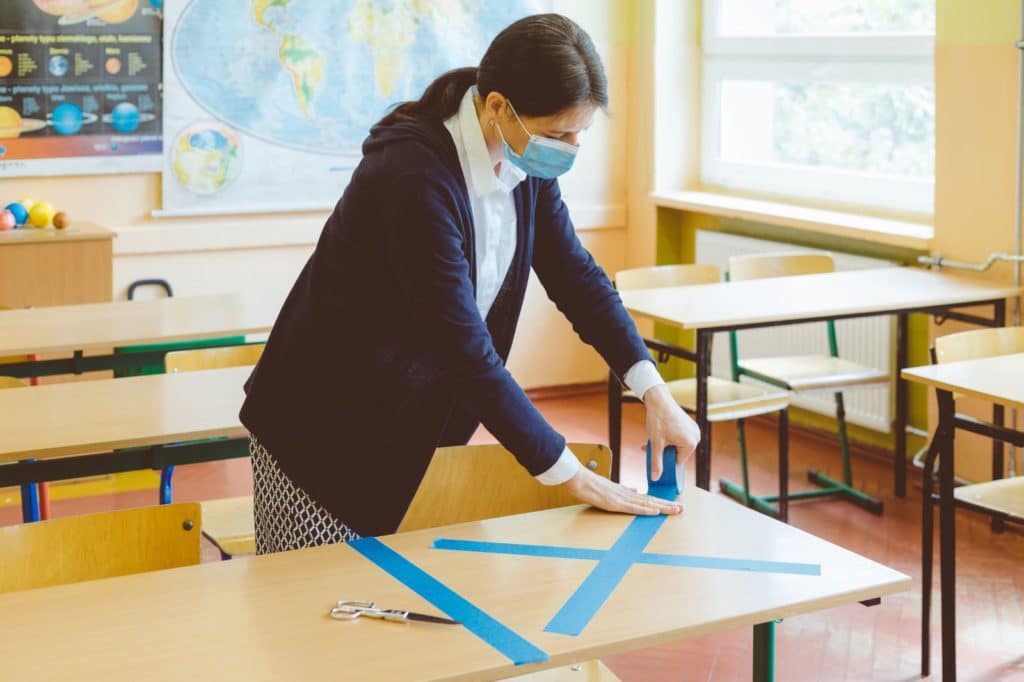Being an educator has always been a rewarding yet challenging profession, but it has become particularly challenging in unique ways during the COVID-19 pandemic. From switching over to virtual teaching practically overnight to navigating new safety protocols to coping with the personal stressors associated with the pandemic, you are likely feeling the weight of being an educator during these stressful and uncertain times.
Keeping your students engaged requires an endless supply of energy and creativity. Battling your own fears and safety needs while also supporting your students can be exhausting. And with resources being scarce and your own and your colleagues’ emotional support reserves stretched thin, you are likely completely drained by the end of the day.
The Real Effects of Isolation and Stress
Educators’ energy levels are not the only things that have been affected by the changes brought on by the pandemic. Research has found that some teachers have been experiencing symptoms of anxiety, depression, and sleep disturbances from the stressors of the pandemic. In one study published in January 2021:
- 6% of teachers reported experiencing stress due to teaching during the pandemic;
- 5% reporting symptoms of anxiety; and
- 2% reporting symptoms of depression.
If you feel like the pandemic if affecting your mental health, you’re not alone. This is an incredibly difficult time, particularly if you’ve been away from work, sick, worried about job security, or struggling with how different being a teacher is right now.
If your school is beginning in-person learning again, you have been out sick, or you’re taking on a greater workload, you may be struggling with feeling isolated or disconnected from both your colleagues and your personal support network — on top of the effects of stress or the mental health symptoms mentioned earlier. Feelings of isolation or disconnection are a typical response to stress, so it’s not surprising if you’ve experienced these at some point during the pandemic.
You might be feeling like you are alone in your struggles or that your usual sources of support (meeting with your colleagues for lunch or getting together after school for happy hour or dinner) are no longer available in the ways that you used to take for granted. Additionally, just as adjusting to virtual learning took time (and you might even feel like you never fully adjusted), adjusting to teaching in person again takes time. You may be feeling a little rusty, overwhelmed, or out of it during the first few weeks.
To help you cope with any feelings of isolation or disconnection you may be experiencing, here are some helpful tips to keep in mind as you reintegrate back into the classroom:
1. Give Yourself Grace
It’s very common to feel overwhelmed or stressed as you adjust to reintegrating into in-person teaching. These are very typical emotions to experience when you adjust to any big change in life. Try not to be too hard on yourself if you find yourself feeling isolated or disconnected. These feelings should start to dissipate over time if you are intentional about creating opportunities for connection with your support network and colleagues (see below).
If you tell yourself, “I shouldn’t be feeling this way, what’s wrong with me?”, it will only increase the negative feelings surrounding your experience of isolation or disconnection. Normalize your experience and give yourself space and time to adjust or find a way to cope with these changes and stressors.
2. Prioritize Yourself
Often when we are under stress, self-care is the first thing to go. We start to skimp on sleep, skip exercising, reach for convenient snacks over nutritious ones, and spend less time with friends. But performing self-care is a powerful stress reliever, so eliminating or reducing the time spent doing self-care is big disservice.
As tempting as it is to eliminate all “me time” activities, try to make space for at least 1 to 2 self-care activities each day. It can be as simple as going for a quick 15-minute walk around your neighborhood or sticking to your bedtime so that you can get as close to 8 hours of sleep as possible. These simple self-care practices can reduce stress and boost your mood, which can make it easier to combat feelings of isolation, disconnection, or overwhelm.
3. Seek Support
Spending time with those whom you consider part of your support network is crucial in times of stress. In fact, research has shown that spending time with people you feel close to can reduce stress levels. If you are feeling isolated or disconnected, try to find creative ways to cultivate connection with others. That could look like setting up a physically distanced walk with a friend or colleague, calling a friend or colleague while you are exercising or commuting, starting a group chat with fellow educators where you can support one another even if you aren’t able to physically get together.
Just because old ways of connecting with others may not be available, it doesn’t mean you have to be isolated and disconnected from your support network. It just means that you have to be creative about finding ways to stay connected.
4. Know When it’s Time to Seek Professional Help
If you feel like you’re struggling and can’t cope with feelings of isolation, loneliness, anxiety, or depression on your own, don’t be afraid to reach out to a licensed therapist to schedule an appointment. Your therapist can provide a space for you to unload your stress, find creative ways to cope, implement helpful strategies, refer you to a psychiatrist for a medication evaluation, and help you identify your priorities.
This is an incredibly challenging time, and there’s no reason that you should have to figure out how to cope with these feelings all alone. Don’t be afraid to reach out for help.










